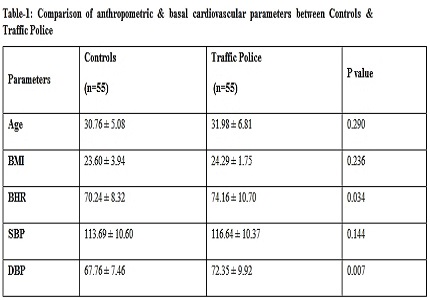Assessment of heart rate variability and reaction time in traffic policemen
Abstract
Introduction: Air Pollution can have a deleterious effect on cardiovascular function and cognition. Heart rate variability (HRV), which is a non-invasive and objective measure of cardiac autonomic function, is a cardiovascular risk predictor. Reaction time is a simple method of assessing the perceptual-cognitive processing capability of the central nervous system. Hence, the aim of the study was to assess the heart rate variability and reaction time in traffic police officers of Puducherry.
Methods: Fifty-five age and BMI matched traffic police and healthy controls were recruited. Basal cardiovascular parameters; basal heart rate, systolic and diastolic blood pressure (BHR, SBP, DBP) were assessed. Short term HRV analysis was done. Time and frequency domain indices were computed. Simple and Choice Auditory and Visual reaction time (SART, CART, SVRT, CVRT) were measured.
Results: BHR and DBP were significantly increased in traffic police. Time domain indices (Mean RR, SDNN, RMSSD, pNN50) were significantly reduced in traffic police. In frequency domain, Total Power was significantly reduced. LF-HF ratio was increased, though not significant. SVRT was significantly delayed in traffic police. CVRT, SART and CART were delayed in traffic police though not significant.
Conclusion: Traffic police have decreased HRV with increased sympathetic and decreased vagal tone, and delayed reaction time.
Downloads
References
Estévez-García JA, Rojas-Roa NY, Rodríguez-Pulido AI. Occupational exposure to air pollutants: particulate matter and respiratory symptoms affecting traffic-police in Bogotá. Rev Salud Publica (Bogota). 2013 Nov-Dec;15(6):889-902.
Newby DE, Mannucci PM, Tell GS, Baccarelli AA, Brook RD, Donaldson K, Forastiere F7, Franchini M, Franco OH, Graham I, Hoek G, Hoffmann B, Hoylaerts MF, Künzli N, Mills N, Pekkanen J, Peters A, Piepoli MF, Rajagopalan S, Storey RF ESC Working Group on Thrombosis, European Association for Cardiovascular Prevention and Rehabilitation; ESC Heart Failure Association. Expert position paper on air pollution and cardiovascular disease. Eur Heart J. 2015 Jan 7;36(2):83-93b. doi: https://doi.org/10.1093/eurheartj/ehu458. Epub 2014 Dec 9.
Lee BJ, Kim B, Lee K. Air pollution exposure and cardiovascular disease. Toxicol Res. 2014 Jun;30(2):71-5. doi: https://doi.org/10.5487/TR.2014.30.2.071.
Gupta S, Mittal S, Kumar A, Singh KD. Respiratory effects of air pollutants among nonsmoking traffic policemen of Patiala, India. Lung India. 2011 Oct;28(4):253-7. doi: https://dx.doi.org/10.4103%2F0970-2113.85685.
Pal P, John RA, Dutta TK, Pal GK. Pulmonary function test in traffic police personnel in Pondicherry. Indian J Physiol Pharmacol. 2010 Oct-Dec;54(4):329-36.
Shields KN, Cavallari JM, Hunt MJ, Lazo M, Molina M, Molina L, Holguin F. Traffic-related air pollution exposures and changes in heart rate variability in Mexico City: a panel study. Environ Health. 2013 Jan 18;12:7. doi: https://doi.org/10.1186/1476-069X-12-7.
Pope CA, Burnett RT, Thurston GD, Thun MJ, Calle EE, Krewski D, Godleski JJ. Cardiovascular mortality and long-term exposure to particulate air pollution epidemiological evidence of general pathophysiological pathways of disease. Circulation. 2004;109(1):71-7. Epub 2003 Dec 15.
Heart rate variability: standards of measurement, physiological interpretation and clinical use. Task Force of the European Society of Cardiology and the North American Society of Pacing and Electrophysiology. Circulation. 1996 Mar 1;93(5):1043-65.
Power MC, Weisskopf MG, Alexeeff SE, Coull BA, Spiro A 3rd, Schwartz J. Traffic-related air pollution and cognitive function in a cohort of older men. Environ Health Perspect. 2011 May;119(5):682-7. doi: https://doi.org/10.1289/ehp.1002767. Epub 2010 Dec 20.
Fonken LK, Xu X, Weil ZM, Chen G, Sun Q, Rajagopalan S, Nelson RJ. Air pollution impairs cognition, provokes depressive-like behaviors and alters hippocampal cytokine expression and morphology. Mol Psychiatry. 2011;16(10):987-95. doi: https://doi.org/10.1038/mp.2011.76. Epub 2011 Jul 5.
Gatto NM, Henderson VW, Hodis HN, St John JA, Lurmann F, Chen JC, Mack WJ. Components of air pollution and cognitive function in middle-aged and older adults in Los Angeles. Neurotoxicology. 2014 Jan;40:1-7. doi: https://doi.org/10.1016/j.neuro.2013.09.004. Epub 2013 Oct 19.
Sharma VK, Subramanian SK, Arunachalam V, Radhakrishnan K, Ramamurthy S, Ravindran BS. Auditory and visual reaction times in school going adolescents: effect of structured and unstructured physical training-a randomized control trial. Int J Adolesc Med Health. 2015 Nov. doi: https://doi.org/10.1515/ijamh-2015-0060. [Epub ahead of print].
Misra A, Chowbey P, Makkar BM, et al. Consensus statement for diagnosis of obesity, abdominal obesity and the metabolic syndrome for Asian Indians and recommendations for physical activity, medical and surgical management. J Assoc Physicians India 2009;57:163–70.
Benarroch EE. Peripheral autonomic system: anatomy, biochemistry and physiology. In: Low PA, Benarroch EE, eds. Clinical autonomic disorders. 3rd ed. Philadelphia: Lippincott Williams & Wilkins; 2008:29–42.
de Paula Santos U, Braga AL, Giorgi DM, Pereira LA, Grupi CJ, Lin CA, Bussacos MA, Zanetta DM, do Nascimento Saldiva PH, Filho MT. Effects of air pollution on blood pressure and heart rate variability: a panel study of vehicular traffic controllers in the city of São Paulo, Brazil. Eur Heart J. 2005 Jan;26(2):193-200. Epub 2004 Dec 3.
Chuang KJ, Chan CC, Su TC, Lee CT, Tang CS. The effect of urban air pollution on inflammation, oxidative stress, coagulation, and autonomic dysfunction in young adults. Am J Respir Crit Care Med. 2007 Aug 15;176(4):370-6. Epub 2007 Apr 26.
Solanki J, Joshi N, Shah C, Mehta HB, Gokhle PA. A study of correlation between auditory and visual reaction time in healthy adults. Int J Med Public health. 2012;2(2):36-8.
Ng AW, Chan AH. Finger response times to visual, auditory and tactile modality stimuli. InProceedings of the International Multiconference of Engineers and Computer Scientists 2012 (vol. 2, pp. 1449-1454).



 OAI - Open Archives Initiative
OAI - Open Archives Initiative


